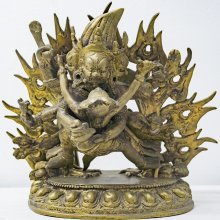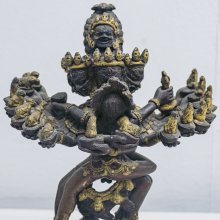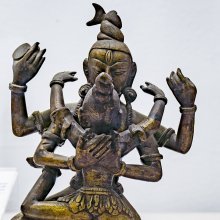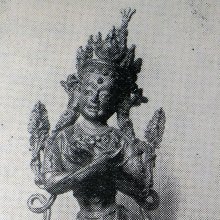Shunya, Śūnya, Śūnyā, Śunya: 27 definitions
Introduction:
Shunya means something in Buddhism, Pali, Hinduism, Sanskrit, Jainism, Prakrit, the history of ancient India, Marathi, Hindi. If you want to know the exact meaning, history, etymology or English translation of this term then check out the descriptions on this page. Add your comment or reference to a book if you want to contribute to this summary article.
Shunya has 27 English definitions available.
The Sanskrit terms Śūnya and Śūnyā and Śunya can be transliterated into English as Sunya or Shunya, using the IAST transliteration scheme (?).
Alternative spellings of this word include Shuny.
Images (photo gallery)
Languages of India and abroad
Sanskrit dictionary
[Deutsch Wörterbuch]
Source: Cologne Digital Sanskrit Dictionaries: Böhtlingk and Roth Grosses Petersburger WörterbuchŚunya (शुन्य):—1. adj. von śvan gaṇa gavādi zu [Pāṇini’s acht Bücher 5, 1, 2.] n. und f. ā eine Menge von Hunden [Trikāṇḍaśeṣa 2, 10, 7.]
--- OR ---
Śunya (शुन्य):—2. adj. = śūnya leer [Hemacandra’s Abhidhānacintāmaṇi 1446.] [Jaṭādhara im Śabdakalpadruma]
--- OR ---
Śūnya (शून्य):—(von 2. śūna)
1) adj. (f. ā) gaṇa gavādi zu [Pāṇini’s acht Bücher 5, 1, 2] (von śvan!). a) leer, öde, unbewohnt, nicht besetzt [Amarakoṣa 3, 2, 6.] [Trikāṇḍaśeṣa 3, 3, 321.] [Hemacandra’s Abhidhānacintāmaṇi 1446.] [Anekārthasaṃgraha 2, 384.] [Medinīkoṣa y. 57.] [Halāyudha 5, 62.] āvasatha [Taittirīyabrāhmaṇa 2, 1, 2, 12.] [The Śatapathabrāhmaṇa 2, 3, 1, 9.] sadas [LĀṬY. 2, 4, 13.] śālā [Kauśika’s Sūtra zum Atuarvaveda 27.] śūnyāgāra [MAITRYUP. 6, 10.] [Manu’s Gesetzbuch 4, 57. 9, 265.] [Suśruta 1, 366, 20. 374, 18. 2, 389, 20.] jagat [Mahābhārata 1, 7669.] vana [3,2361. 2401. 13,2298.] [Harivaṃśa 3489.] [Rāmāyaṇa 1,9,58. 55,24.2,36,12. 37,27. 42,23. 88,17.] [Rāmāyaṇa Gorresio 1,49,14.] [Spr. 2730. 3011. fg. (II) 444. 685. 1079. 1435. 1631.] [Śākuntala 74. 94,5.] [Varāhamihira’s Bṛhajjātaka S. 51,4. 95,5. 58.] [BṚH. 24,8.] [Kathāsaritsāgara 3,33. 18,158. 27,147. 37,57. 86,108.] [Rājataraṅgiṇī 4,171.] [Oxforder Handschriften 268,a,37.] [Bhāgavatapurāṇa 3,24,28.5,14,20.] ratha [Rāmāyaṇa 2, 52, 38.] paryaṅka [72, 11.] vājin so v. a. ohne Reiter [Kathāsaritsāgara 26, 86.] leer so v. a. ausgeleert, seines Inhalts beraubt [33, 138.] cira [124, 71.] [Spr. 3011.] bahu [Mahābhārata 3, 12842.] dūraśūnyo dhvā [Amarakoṣa 2, 1, 18.] [Hemacandra’s Abhidhānacintāmaṇi 985.] a [Pāraskara’s Gṛhyasūtrāṇi 1, 5.] [Kātyāyana’s Śrautasūtrāṇi 2, 4, 4. 30. 8, 12.] dvāraṃ śūnyamaśūnyaṃ vā [Vetālapañcaviṃśati] in [Lassen’s Anthologie (III) 23, 11. fg.] aśūnyāṃ kurvate nityaṃ guhām so v. a. verlassen nicht [Rāmāyaṇa 4, 44, 113.] [Rāmāyaṇa] [SCHL. 2, 32, 24.] aśūnyopasthā so v. a. fruchtbar [Weber’s Indische Studien 5, 315.] — b) leer von einem Blick so v. a. auf kein festes Ziel —, in’s Blaue gerichtet [MĀLATĪM. 11, 8.] [AṢṬĀV. 17, 9.] manas, hṛdaya, āśaya, citta so v. a. an Nichts denkend, nicht bei der Sache seiend, abwesend, zerstreut: puraṃ śūnyena manasā prayayau [Mahābhārata 2, 608. 13, 2758.] [Rāmāyaṇa 3, 50, 24.] [Spr. (II) 2047.] manas adj. [2473.] mūrkhasya hṛdayaṃ śūnyam [444.] hṛdaya adj. [Rāmāyaṇa 4, 29, 6.] [Śākuntala 47, 7] (im Prākrit). [Kathāsaritsāgara 95, 54.] śūnyāśaya adj. (f. ā) [25, 165. 95, 53.] [Spr. (II) 5612.] citta [AṢṬĀV. 17, 18. 18, 24.] Von Personen Nichts im Sinne habend, an Nichts denkend, mit seinen Gedanken abwesend [MAITRYUP. 2, 4. 6, 23] (bhūta). [28.] śūnyena khalu mayedaṃ samudāhṛtam [Rāmāyaṇa 2, 13, 16 (10, 27 Gorresio).] [Kumārasaṃbhava 3, 75.] [Kathāsaritsāgara 123, 137.] vat [Daśakumāracarita 66, 14.] bhūta [Mārkāṇḍeyapurāṇa 78, 6.] — c) leer so v. a. besitzlos, von Allem beraubt [Spr. (II) 720.] jīvitaṃ me sakhā apahṛtastvayā . tacchūnyaṃ dehamapyetaṃ tvaṃ gṛhāṇādhunā mama .. [Kathāsaritsāgara 74, 130.] allein, ohne Gefährten, - Begleitung, alleinstehend [Rāmāyaṇa 3, 20, 35. 65, 1.] [Bhāgavatapurāṇa 1, 14, 44.] — d) mit einem instr. einer Person oder Sache beraubt, einer Sache baar, ohne Jmd oder Etwas seiend, frei von [Vikramorvaśī 130.] [Śiśupālavadha 8, 70.] [Kathāsaritsāgara 78, 41.] [Bhāgavatapurāṇa 1, 15, 20.] [Bhāṣāpariccheda 69.] Gewöhnlich in comp. mit der Ergänzung: vṛkṣaśūnyā pṛthvī [Harivaṃśa 95.] śokaśūnyena manasā [Rāmāyaṇa Gorresio 2, 97, 5.] [Yogasūtra 1, 9. 43.] [Meghadūta 93.] [Raghuvaṃśa 4, 85. 5, 49. 74.] [Vikramorvaśī 66, 1.] sarvaśūnyā daridratā [Spr. (II) 444. 685.] ahitahitavicāraśūnyabuddhi [?826. 1158. 1771. 2919. 3984. 4837. 5372, v. l. 5437. Amarakoṣa 3, 3, 2. Hemacandra’s Abhidhānacintāmaṇi 1497. Trikāṇḍaśeṣa 3, 3, 217. Kathāsaritsāgara 31, 17. 111, 63. zu Bṛhadāranyakopaniṣad S. 140. Mārkāṇḍeyapurāṇa 51, 105. Bhāgavatapurāṇa 5, 1, 16. Bhāṣāpariccheda 15. SARVADARŚANAS. 47, 17. 61, 18. Scholiast zu Śākuntala 86.] — e) unausgeführt, unausgerichtet: tvamapi niyogamaśūnyaṃ kuru so v. a. richte aus [Śākuntala 24, 16. 81, 4.] — f) mangelnd, fehlend, nicht da seiend: saṃvaraṇārakṣā (rājadhānī) [Rāmāyaṇa 2, 88, 19.] vyāpāra (= vyāpāra) [Prabodhacandrodaja 100, 15.] hṛdaya [Pañcatantra 208, 22.] — g) leer so v. a. eitel, nichtig; in Wirklichkeit nicht seiend: vācaḥ [Rāmāyaṇa 3, 61, 48.] prativacana [Pañcatantra 117, 14.] phala [Śrutabodha] [?(BR.) 5.] aśūnyajanman adj. [Rājataraṅgiṇī 3, 430. 444.] yattadbrahma paraṃ sūkṣmamaśūnyaṃ śūnyakalpitam [Bhāgavatapurāṇa 9, 9, 49.] [NṚS. TĀP. Upakośā] in [Weber’s Indische Studien 9, 149.] [BURNOUF, Intr. 462.] [Hiouen-Thsang 1, 443.] [SARVADARŚANAS. 9, 8. 14, 3. 15. 15, 9. 22, 9.] —
2) f. ā = malī (?) [Trikāṇḍaśeṣa] (so nach den Corigg. zu lesen) und [Medinīkoṣa] = tūlikā [Hemacandra’s Anekārthasaṃgraha] = nalī (so [Trikāṇḍaśeṣa] im Text) [Śabdakalpadruma] nach [VIŚVA] und [Medinīkoṣa] = mahākaṇṭakinī [Śabdacandrikā im Śabdakalpadruma] = vandhyā [Rājanirghaṇṭa im Śabdakalpadruma] —
3) n. a) Leere, Einöde, ein von Menschen nicht bewohnter oder im Augenblick nicht besetzter Ort [Amarakoṣa 3, 4, 13, 59.] [Mahābhārata 1, 2846. 4, 1178. 7, 302. 679.] [Rāmāyaṇa 2, 28, 8. 77, 6. 96, 15. 3, 40, 28. 51, 17. 4, 29, 6.] [KĀM. NĪTIS. 5, 78.] [Bhāgavatapurāṇa 1, 14, 14.] [Pañcatantra 231, 18.] na khalvahaṃ śūnye raumi kiṃ na śṛṇoṣi me [Mahābhārata 1, 3022.] [Bhaṭṭikavya 18, 29.] āpūrṇatāmeti [Spr. 5078.] raṅgasyāśūnyahetorhi tiṣṭhantviha ca pārthivāḥ [Harivaṃśa 6030.] — b) Nichts, Abwesenheit von Allem [Kapila 1, 43. fg.] [Colebrooke 1, 347.] [AṢṬĀV. 20, 1.] bhittibuddhikaraṃ śūnye bhittau śūnyapratītidam (purodyānam) [Kathāsaritsāgara 29, 59.] nītastenaiva śūnyāya nīhāra iva bhānunā [Bhāgavatapurāṇa.6,13,20.] [Oxforder Handschriften 229,a, No. 561.] mata der Buddhisten [250,b,43.] śūnyamātmetivadati (aparo bauddhaḥ) [Vedānta lecture No. 89.] = śūnyatā das Nichtdasein von: svarūpa [Oxforder Handschriften 229,a, No. 561.] — c) Null und das Zeichen dafür (= bindu [Hemacandra’s Anekārthasaṃgraha]) [Algebra 19.] [Weber’s Indische Studien 8, 444. fgg.] [Oxforder Handschriften 250], b, [?4. Varāhamihira’s Bṛhajjātaka S. 8, 20. GAṆIT. MADHYAM. 4. Kunde des Morgenlandes 2, 425.] Vgl. [DIEZ], Etym. Wört. d. romanischen Sprachen unter cifra. — d) der Luftraum [Śabdacandrikā im Śabdakalpadruma] — e) Bez. einer best. Himmelserscheinung (upagraha) [JYOTISTATTVA im Śabdakalpadruma] unter vajraka . — f) Ohrring [Spr. (II) 2489.] — Vgl. tṛṇa, pari, puṣpa, mahā, muṣka, vastu, vi .
Sanskrit, also spelled संस्कृतम् (saṃskṛtam), is an ancient language of India commonly seen as the grandmother of the Indo-European language family (even English!). Closely allied with Prakrit and Pali, Sanskrit is more exhaustive in both grammar and terms and has the most extensive collection of literature in the world, greatly surpassing its sister-languages Greek and Latin.
See also (Relevant definitions)
Starts with (+75): Shunya-sahanashilatako-niti, Shunya-vibhakti, Shunyabandhu, Shunyabhava, Shunyabindu, Shunyacitta, Shunyadaivata, Shunyadeha, Shunyadhva, Shunyadrishti, Shunyagara, Shunyagarakritalaya, Shunyagaravasa, Shunyagarti, Shunyageha, Shunyagrama, Shunyahara, Shunyahasta, Shunyahetu, Shunyahridaya.
Ends with (+50): Abhimanashunya, Aksharashunya, Amtahshunya, Amtashshunya, Apaishunya, Arthashunya, Ashunya, Atishunya, Atyantashunya, Bahushunya, Balaghata-shunya, Bhavashunya, Buddhishunya, Cira-khila-shunya, Drishtishunya, Durashunya, Gatishunya, Harashunya, Hetushunya, Hridayashunya.
Full-text (+239): Svarashunya, Prantarashunya, Shunyageha, Shunyasthana, Shunyamadhya, Trinashunya, Shunyata, Abhimanashunya, Shunyavadin, Shunyahridaya, Shunyahasta, Shunyavyapara, Shunyavat, Shunyapadavi, Shunyatva, Shunyavada, Shunyapala, Lajjashunya, Mamatashunya, Bhavashunya.
Relevant text
Search found 77 books and stories containing Shunya, Śūnya, Śūnyā, Sunya, Śunya; (plurals include: Shunyas, Śūnyas, Śūnyās, Sunyas, Śunyas). You can also click to the full overview containing English textual excerpts. Below are direct links for the most relevant articles:
Bhakti-rasamrta-sindhu (by Śrīla Rūpa Gosvāmī)
Verse 2.4.218 < [Part 4 - Transient Ecstatic Disturbances (vyābhicāri-bhāva)]
Verse 1.1.11 < [Part 1 - Qualities of Pure Bhakti (bhagavad-bhakti-bheda)]
Verse 2.3.13 < [Part 3 - Involuntary Ecstatic Expressions (sattvika-bhāva)]
A History of Indian Philosophy Volume 2 (by Surendranath Dasgupta)
Part 2 - The Ultimate Entity < [Chapter XII - The Philosophy of the Yogavāsiṣṭha]
Part 12 - Yoga-vāsiṣṭha, Śaṅkara Vedānta and Buddhist Vijñānavāda < [Chapter XII - The Philosophy of the Yogavāsiṣṭha]
Part 16 - Vedānta Dialectic of Śrīharṣa (a.d. 1150) < [Chapter XI - The Śaṅkara School of Vedānta (continued)]
Maha Prajnaparamita Sastra (by Gelongma Karma Migme Chödrön)
Emptiness 4: Emptiness of Emptiness (śūnyatāśūnyatā) < [Chapter XLVIII - The Eighteen Emptinesses]
III. Emptiness according to the Madhyamaka < [Note on emptiness (śūnyatā)]
The Samṛddhi-sūtra < [Chapter XLVIII - The Eighteen Emptinesses]
Shat-cakra-nirupana (the six bodily centres) (by Arthur Avalon)
Sahitya-kaumudi by Baladeva Vidyabhushana (by Gaurapada Dāsa)
Text 4.26 < [Chapter 4 - First-rate Poetry]
Text 10.139 < [Chapter 10 - Ornaments of Meaning]
Text 10.183 < [Chapter 10 - Ornaments of Meaning]
Cidgaganacandrika (study) (by S. Mahalakshmi)
Verse 103 [Divyaugha Janani] < [Chapter 3 - Third Vimarśa]
Verse 33 [Forms of Manifestation] < [Chapter 2 - Second Vimarśa]
Forms of Praṇava < [Chapter 4 - Fourth Vimarśa]
Related products




.jpg)

